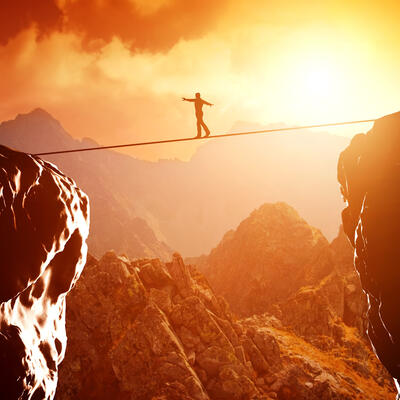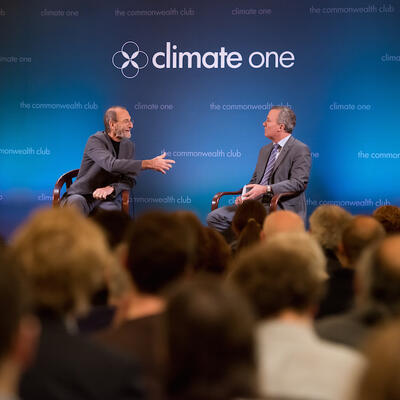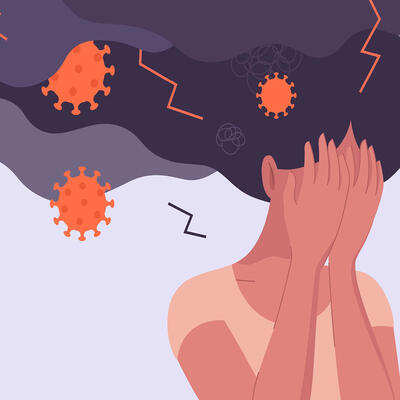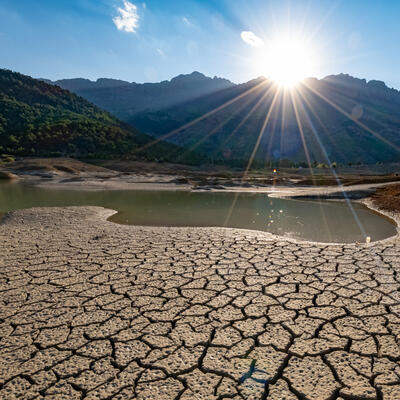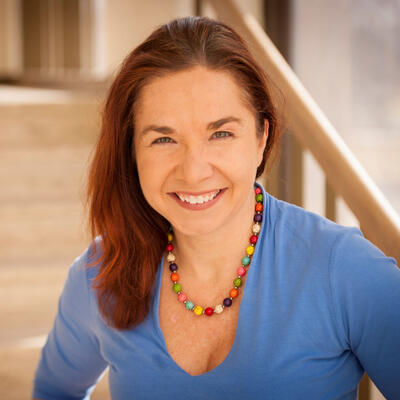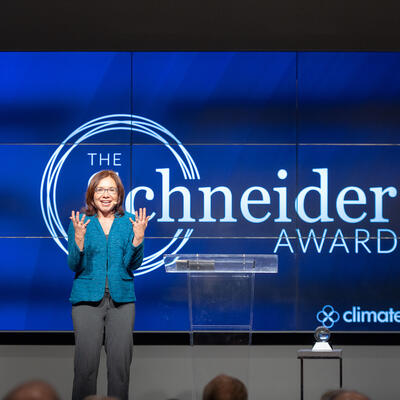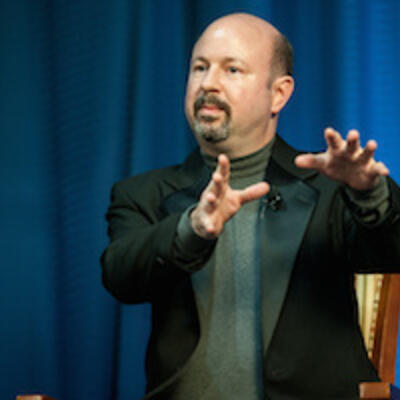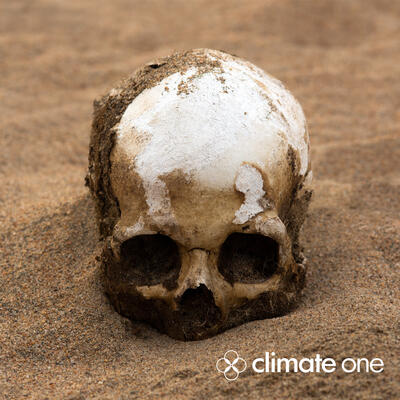
David Wallace-Wells: The Uninhabitable Earth
Guests
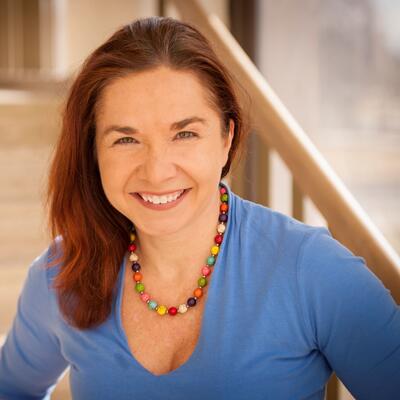
Katharine Hayhoe
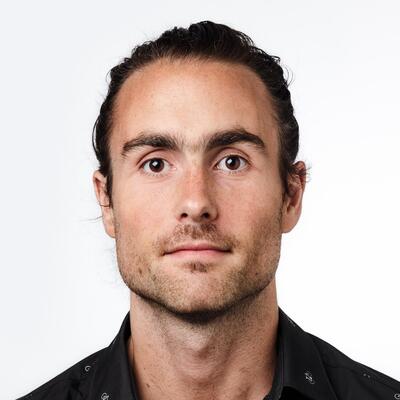
David Wallace-Wells
Summary
At what point does Planet Earth become inhospitable to life – let alone a flourishing human civilization?
In his new book The Uninhabitable Earth: Life After Warming, David Wallace-Wells explores how climate change will impact not just the planet, but human lives – including how a five degree increase in temperatures would make parts of the planet unsurvivable.
“The more I learned about the science the deeper I got into it… the more scared I was,” he admits, “and from where I sat as a journalist the importance of telling that story so that other people have the same reaction have the same response.
Paradoxically, though he has only been writing about it for a few years, Wallace-Wells has found climate change to invigorate him as a storyteller. “It's an epic saga,” he says. “It's the kind of thing that we only used to see in mythology and theology. We really do have the fate of the world and the species in our hands.”
Another climate communicator, Katherine Hayhoe from Texas Tech University, recognizes the need for storytellers like Wallace-Wells to translate the work of scientists like her.
“We’re not missing the apocalyptic vision of the future, I think we've got that in spades,” she says. “What David’s book does is it takes what we've been saying in scientific assessments for years and even decades, and it rephrases in a way that’s hopefully more accessible for people to understand how bad this could be.”
That said, Hayhoe also recognizes a need for other writers and creative artists to tell climate stories that move us beyond doom-and-gloom. “We scientists are terrible at positive visions of the future, all we’re good at is diagnosing the problem in greater and greater detail,” she laments. “We need others to help us see what that future looks like. Because when you look at something that’s better than what we have today, you can’t hold people back from moving in that direction.”
Full Transcript
Greg Dalton: This is Climate One, changing the conversation about energy, the economy, and the environment. [pause] How much climate disruption can human civilization withstand?
David Wallace-Wells: We've exited the climate conditions that presided for all of human history. And so all of the things that we take for granted as features of human life defined very broadly were the result of those conditions which no longer preside.
Greg Dalton: Is that prospect just not scary enough to move more people and governments to act?
Katherine Hayhoe: The myth that most of us have bought into is the myth that it doesn’t matter to me. And of course the reality is climate change matters to every single one of us if we’re human living on this planet.
Greg Dalton: Or is the fear of a destabilized climate too much to face up to?
David Wallace-Wells: The science is really alarming. But the responsible response to scary science is to try to take action.
Greg Dalton: The Uninhabitable Earth. Up next on Climate One.
Greg Dalton: At what point does Planet Earth become inhospitable to life – let alone a flourishing human civilization? Climate One conversations feature oil companies and environmentalists, Republicans and Democrats. I’m Greg Dalton. Underwriting for today's program was generously provided by the Susie Tomkins Buell Foundation.
Greg Dalton: [sarcastically] Scientists must be exaggerating when they tell us that a few degrees of warming will make life on Earth nasty, brutish, and short… right?
Katherine Hayhoe: It is definitely a possibility scientifically speaking that large parts of the world could be uninhabitable if climate change continues unchecked beyond this century.
Greg Dalton: That’s Katherine Hayhoe, an atmospheric scientist at Texas Tech University, reacting to the title of a new book called The Uninhabitable Earth: Life After Warming. The author is David Wallace-Wells, Deputy Editor at New York Magazine, and our first guest on today’s program. Katherine Hayhoe will also join the conversation later in the show. We start with some of the positive things David sees emerging amidst the climate crisis.
David Wallace-Wells: You know, the last six months have been for me exhilarating in terms of how much political progress has been made on climate. I think in the U.S. we've got the Sunrise Movement, leading to the Green New Deal proposals. We have a kind of arms race unfolding among presidential candidates competing to be the most ambitious on climate. From a domestic perspective I think that was basically unthinkable a few years ago, maybe even a few months ago. And the same is happening abroad and, you know, in the U.K. with the Extinction Rebellion and the Parliament just declared a climate emergency in England. Published report showing how they might get to zero emissions by 2050, which may be a little slower than would be optimal, but is still much, much more ambitious than anything that have been talked about seriously by the government before. And across the E.U. with the Greta Thunberg’s climate strike we’re seeing again just huge, huge political movement. And I'm a newbie in this area I've only been writing about it for a few years, but if had you told me just a couple of years ago that we’d be where we are now seeing as much movement and as much progress as we've seen, I wouldn’t have believed you. I thought that our politics were inert on the subject. I think we’re probably moving too slowly given the state of the crisis but at the same time much faster than anybody could've predicted or I think anticipated until quite recently which is really actually great.
Greg Dalton: It is really exciting. For those of us who’ve been around a while, I’m an old guy, I’m having a little bit of déjà vu from 2007, 2008 around Al Gore's movie, Copenhagen the election of Obama. There was a similar kind of feeling of movement that ended in disappointment. Let's see if this one can end differently. I’d like to ask you how did fear move you out of climate complacency.
David Wallace-Wells: Well, I think the question sort of answers itself. The more I learned about the science the deeper I got into it which is really kind of over the course of 2016, the more scared I was. And that meant the more engaged I was in the urgency of the problem and the crisis. And from where I sat as a journalist the importance of telling that story so that other people have the same reaction have the same response I was you know, I’m 36 years old I was raised mostly in the ‘90s, I came of age in the ‘90s is I have a kind of very end of history perspective on the future. I thought, you know, I knew that markets were imperfect and globalization was imperfect. And, you know, the future was not going to be endless bounty for everyone on earth. But I also felt that we could probably count on it getting better and I thought that climate change was going to be part of that story that it was an issue it was a major issue but also one that was within our power to address and control. And that probably the leaders that we had would be responsible enough to take care of it. I also felt that the story was a long one. I sort of been led to believe like I think a lot of us that climate change is a really slow moving phenomenon and that meant that we didn’t need to take dramatic action quickly. We could develop our way out of the problem we could invent our way out of the problem. When I realized just a year or two ago that, you know, half of all of the emissions that we put into the atmosphere in the entire history of humanity have been put into that atmosphere the last 30 years that really, really opened my eyes. It made me think this is not something that will unfold in a lifetime of my grandchildren. It something that’s unfolding in my lifetime in fact, has already unfolded in my lifetime. When I was born the planet's climate was relatively stable scientists were worried about the long-term but in the near-term things were okay. We’re now in a situation where we’re basically face-to-face with real climate catastrophe and that is because of what's been done just in 30 years. The next 30 they promised to be just as consequential. And we could in those 30 years choose to take a path that produces some incredibly terrifying depressing punishing climate impacts or one that allows us to avoid at least most of those impacts and secure a kind of more fulfilling and prosperous and just future for ourselves and our children. And the scale of that story remains astonishing and kind of invigorating to me as a storyteller, it's an epic saga. It's the kind of thing that we only use to see in mythology and theology. We really do have the fate of the world and the species in our hands and each of us who’s alive today is a protagonist in that story making choices political and otherwise they're going to determine that future. That's just incredible drama. And so in addition to fear I was sort of woken up by the sense of the scale of that story. And as a storyteller the need to share the sense of drama with, you know, any reader who would have been basically.
Greg Dalton: So we live in an age of hyper speed and hyper scale. We’re here in Silicon Valley and things have happened dramatically in one generation. Most people in the world can have in their hands most of the knowledge accumulated by humankind in all times. Just think about that and that is really speed and we embrace that yet it’s the speed and scale of climate somehow that's really hard for us to grasp.
David Wallace-Wells: I think they may be related because some technology some of the trajectories of technology have taught us that change can happen very quickly. And especially if you have a lot of faith in the technological solutions to climate change you can think, oh these things will get figured out they’ll get sorted out down the line. I think that that is given the state of the crisis really a problematic perspective, you know, the U.N. says that in order to safely avoid 2° of warming which most of the scientists in the world consider the threshold catastrophe and island nations in the world call genocide, we’ll need to have our emissions by 2030, which is basically a decade from now. The Secretary-General says we need a global World War II mobilization effort against climate to achieve that and that needs to start this year. And when you think about all of the components that would go into such a solution, you know, the energy sector is one that we think about a lot it’s probably the easiest because thanks to the progress of renewables we actually do have a ready-made alternative toward dirty energy sources. In much of the world, it's already cheaper than dirty energy probably will be cheaper in all the world soon. But some of the other sectors for instance, infrastructure industry transportation, these are sectors that take quite a long time to rebuild. I mean if we really want to zero out our emissions from infrastructure, they’ll take quite a while. If we really want to zero out our emissions from airplane travel we need to first of all, invent a completely new kind of airplane then build factories to produce them and then place them into our, you know, the fleets of our airlines. That's not something you can do in a year or two years. And so we really need to achieve all of that in the next 12 years. I think counting on technological progress to solve the problem for us without real political intervention I think it's you know, bit delusional. It means that we’re living in a bit of denial or complacency or somewhere in that problematic nexus.
Greg Dalton: Right. So your book is heavy-duty and you write it, it’s a synthesis it looks like kind of the second half of the bell curve kind of the more damaging perhaps less probable outcomes. How do you sit with that and hold that darkness without getting sucked into it. Because I’ve seen people like I would say, you know, Jim Hansen spent so much time looking at dark models that he kind of got, he got pretty dark and dour himself. How do you prevent yourself from being consumed by the darkness that you're trying to share with us?
David Wallace-Wells: Yeah, I mean part of it is living myself a bit in denial and in complacency and compartmentalization. I think probably that's gonna be a human response to this kind of suffering no matter how much of it unfolds, which is a tragedy and something we should fight against. But I also think it's in ways kind of inevitable. But, you know, I also try to remember that as horrifying as some of these really climate impacts could be, you know, if we end up on the track we’re on at the end of the century we could have twice as much war as we have today. We could have agricultural yields that are half as bountiful as the ones that we have today trying to feed 50% more people. We could have a global GDP that's 30% smaller than it would be without climate change its impact as twice as deep as the Great Depression it will be permanent. All this place in the world would be hit by six climate driven natural disasters at once. Climate refugees in the hundreds of millions, perhaps in the billions according to the U.N. Those impacts are horrifying they can sound and seem paralyzing. But I also try to remember that they are ultimately a reflection of our power over the climate because the main thing that's driving climate change is human action it's how much carbon we put into the atmosphere. We have our hands on those levers. If it is possible to get to that quite hellish 4 degree scenario that we’re on track for that is just a sign of how in control of the climate we are. And therefore how much we could conceivably choose a different path should we want to. Now, there are a lot of political obstacle social obstacles cultural obstacles that would prevent us from making different choices rapidly and really avoiding all of those outcomes. But I think we fall into a trap when we think of the story as being beyond our control something that’s unfolding without our input. The only thing that's actually driving it is our input. And, you know, that leads us to some complicated questions about who we are and what our inputs are and who’s making these decisions and, you know, again those are really complicated questions. But pulling back and adopting a kind of global perspective. If we find ourselves living in a climate dystopia it will be because of human action. And to me that's an argument for more action in the other direction now. And ultimately it's a kind of perversely empowering perspective.
Greg Dalton: Christiana Figueres who is the lead negotiator for the Paris Climate accord was here last year and she says, change begins within, all change begins with self. And so I’d like to hear your thoughts on that because that leads to this question of, you know, what can I do, change myself. But then one might say, well individual change is trivial and perhaps distracting.
David Wallace-Wells: Yeah, I mean my feeling about this is maybe not entirely popular. But my feeling is that, you know, people who want to reduce their own carbon footprints should it’s valuable in the sense of advertising to other people that you can live a fulfilling prosperous modern life, and still be responsible. It's also helpful in terms of inspiring policy action, but ultimately the scale of the challenge is just so much bigger than anything we can possibly achieve through individual action. And, you know, you think about diet which is one portion of the carbon problem. There's a lot of energy these days around people going vegan eating less red meat, for the sake of reducing carbon emissions. And I think that's valuable, but if we really truly need to get to zero emissions perhaps as soon as 2050, which is what the U.N. says maybe even sooner than that. I just don't think that we’ll be able to get there through a global veganism movement. I think that whatever people like you and I do whatever everyone in this room does, whatever even all Americans do over the next couple of decades. The world's a really big place and I don't think we’re gonna be able to compel every single one of the 8 billion people on the planet to give up animal proteins for the sake of climate. I think that means that what we need to do is engineer some policy solutions that could make it possible for us to continue eating in the ways that we would like to without imposing a carbon cost on the future. And for me, you know, this is a set of small-scale studies, but there's a lot of hope in the fact that researchers have found that if you feed cattle small amount of seaweed their methane emissions could go down by as much as 95% or 99%. Which would eliminate not entirely, but mostly eliminate the carbon problem of beef. We could conceivably legislate that they be required to do that. The same holds true for air travel, which you hear a lot about in place like San Francisco in place like the U.S. If everyone we know, if everyone in the entire U.S. vowed to never take a plane again which is quite unlikely, but even if that happened there’ll be hundreds of millions of people elsewhere in the world who are gonna be eager to continue flying. And to me what that means is that we need as I said earlier, completely new set of new kind of airplanes with either electric plans or flying on zero carbon fuel that requires R&D money probably such enormous amounts of it that it would have to be public. And it will also require governments to require manufacturers, make these kinds of planes rather than the old kinds of planes and that airlines put them into service quite quickly. I think that in every sector in every area the problem is so large and so complicated that we can hope to address it adequately through individual action, even though individual action can be a kind of useful motivating mobilizing way station on the way to policy change. But ultimately for me, it's all about politics it has to be that’s how big the problem is.
Greg Dalton: You’re listening to a Climate One conversation about how parts of earth may become uninhabitable. Coming up, more with author David Wallace Wells, and Katherine Hayhoe on how writers and storytellers can supplement the work of climate scientists like her by offering a positive vision for the future.
Katherine Hayhoe: When you look at something that’s better than what we have today, you can’t hold people back from moving in that direction. That's what we’re missing here is how the future could be better than today.
Greg Dalton: That’s up next, when Climate One continues.
Greg Dalton: This is Climate One. I’m Greg Dalton, and we’re talking about life after global warming with David Wallace Wells, Deputy Editor at New York Magazine and author of The Uninhabitable Earth. I asked Wallace-Wells about the gaps he sees in media coverage of climate change, particularly when it comes to sea level rise.
David Wallace-Wells: When I started writing about climate I really thought that there was sort of three kind of public misperceptions held at least by people like me. And by that I mean, you know, I'm a lifelong New Yorker and I felt, you know, because I live in an urban fortress like that that I was somehow living outside the force of nature. While I worried about climate change I thought it would hit elsewhere it would hit populations elsewhere. And in some way that living in the modern world at all, but especially in an urban environment like I was, meant that we had sort of exited or conquered the forces of nature. And you know the three true main misperceptions I sort of already talked about the first one which was is about speed that climate change is happening much faster than we all understood. The second one was as you say about scope and you know, we heard so much about sea level rise, and Arctic ice melt over the last few decades. In part because in the long term it probably is the most dramatic climate impact. But it unfolds over centuries, which means over the next few decades we’re likely be more impacted by many, many other areas. So I mentioned the economic impacts the impact on conflict. Conflict also gets worse at the level of individual, so you have higher rates of rape and murder domestic assault when it's hotter out. The agricultural yields, the public health concerns we’re likely to see mosquitoes that used to only fly in the tropics, flying as far north as the Arctic Circle relatively soon which is astonishing. They’ll be carrying all those diseases all around the world. Wildfire extreme weather, you know, hurricanes in the Caribbean one after the other. We’ve already seen in Houston three 500-year storms in three years. Storm just supposed to hit once every 500 years tells you we’re really living in an unprecedented climate situation. But when you look at each of these areas, each of these impacts you see that this is not a story that could be compartmentalized at all. It's not a matter of living a little bit farther from the coast and letting some of that land go under the ocean over the course of centuries. No matter where you are, even if you're extremely wealthy part of an extremely wealthy country very far from the ocean, you're still going to be impacted in some way. And I think that that's really profoundly important for us all to understand and appreciate. Climate change punishes unequally so the global South which is already suffering intensely from climate change will be suffering considerably more in the decades ahead. But it also does punish universally and there won't be any place on the planet if we let this course continue that will be unaffected. And I think really ultimately that calls us much more directly to action. I hope that it also makes us empathize with those elsewhere in the world who are suffering more but to the extent that we are all also self-interested creatures. I think it’s important to understand that everyone's own lives and the lives of those they love will be impacted by these forces if we don't change course. And that's what makes it such a global all-encompassing all impacting story.
Greg Dalton: David, one interesting thing about your path is that a lot of people think that a connection to nature is essential vital to then be aware of it and then want to preserve it. But that's not the case with you. Tell us about your relationship with nature.
David Wallace-Wells: Yeah, I mean I think the natural world is beautiful I’m moved by like the David Attenborough documentaries and especially the new ones which have such incredible photography. But, you know, as I said earlier I'm a lifelong New Yorker and honestly I think I’m probably gonna be living in cities my whole life. And while I sometimes travel into places that are a little less dense and a little less totally paved over and man-made than New York. I also honestly feel that if I could trade the beauty of the natural world for the stability and prosperity and security of future human life, I would actually take that trade. To me I'm an unusual person on the environmental left in this way because I'm really primarily and almost exclusively concerned about the fate of humans. And I think ecosystem collapses problematic and worrisome largely because of how it will impact human life. I think it's also tragic, but I'm not moved by the strategies in the same way that many others who are fighting this fight are. But unfortunately, we can't continue to live the way that we live or have the expectations for the future that we’ve had over the last few decades, unless we quite dramatically change course with our carbon. And that to me is the most important pressing fact, you know, when I read about 60% of vertebrate mammals have already died since 1978 according to the World Wildlife Foundation or the huge insect die off that entomologists have been documenting over the last few years. Those things concerned me primarily because of how they impact human life and I know that there are others who feel differently. But I think that the challenge ahead of us is so intense, you know, the word existential gets thrown around a lot and I don't think it's the case that the human species is going to face extinction anytime soon. But the conditions of our existence are going to be so profoundly transformed by these forces but I think we, you know, we ought it to ourselves to focus on the threat to humans as much as we can, rather than being distracted by the plight of others. Now if we really solve the problem we’ll also be securing the lives of all the other species on the planet to the extent that isn’t possible. But personally I'm motivated more by the plight and the plight of humans and the threat to future human life by, you know, the natural world or all those other creatures living in it.
Greg Dalton: We’re talking with David Wallace-Wells, deputy editor of the New York magazine and author of the new book The Uninhabitable Earth: Life After Warming. I'm Greg Dalton. Now we’re gonna bring in Katharine Hayhoe who’s joining us from Texas Tech University in Lubbock, Texas. This is the first time we've included a guest remotely on the show. Katharine, welcome.
Katharine Hayhoe: Thank you for having me.
Greg Dalton: So what's your take on the uninhabitable earth, your view of, you know, did it exaggerate the science is the title an exaggeration?
Katharine Hayhoe: It is definitely a possibility scientifically speaking that large parts of the world could be uninhabitable if climate change continues unchecked beyond this century. But the most important message I think is one that David has already highlighted not just the fact that our choices make the world of difference. The planet really is on our hands and when we look to the future and my own work looks at future projections. The difference between a 1 1/2, a 2 degree world, a 4 degree world the biggest difference is we see in the choices that we make.
Greg Dalton: And can an individual make choices that are meaningful. David has said that, you know, the idea that we’re gonna recycle our way out of this we all go vegan, is that just kind of delusional or can that have some kind of accumulated impact?
Katharine Hayhoe: I appreciate his honesty. Because so often we are presented with oh, if everybody did X, that would fix the problem. And we know as scientists that that is not true. There is no one silver bullet that will fix this whole problem. And in fact, even if everyone in the United States in North America who cared about this went to a carbon neutral lifestyle, if they could afford to do so, that still wouldn't even make more than a tiny, tiny dent in the overall magnitude of the problem. So that's why when people asked me what’s the most important thing we can do and they expect me to stay change your light bulbs, recycle or go vegan. I say the most important thing we can do is talk about it because public opinion data shows that most of us agree that this is a real problem. It will affect future generations, plants and animals people in developing countries but we don't think it matters to us. And so that's why having this conversation is so important because if we don't care why would we act and if we don't talk about it, why would we care.
Greg Dalton: And David you said earlier that fear really motivated you. My experience is that fear can sometimes turn people away either paralyze them or turn them away. Have you had people say to you, you’re bumming people out. David, just lighten up a little bit because people can't handle how heavy it is.
David Wallace-Wells: Well, the book grew out of an article that I wrote a few years ago, which was more focused on real worst-case scenarios. And I had certainly had some of that response when that article was published. The response to the book I’d say is actually been quite positive, even among scientists who don't take quite as alarmist a perspective in the public talking about the issue as I do. And I think that's in part because the conversation has really changed even in these two years since I originally published that article and since the book was published. I mean the real turning point I think was this U.N. report from last October which looked at the difference between 1.5 degrees and 2 degrees and was not based on new science. You know, anybody who is following it knew everything that was collated in there but did represent a rhetorical shift in the presentation of that science and was a much stronger more clearer and urgent call to arms from scientists than any equivalent body had issued before. And I think at the time there were probably even some scientists who thought that that might've been a little, you know, pushing things a little too far. But if you look at the last six months as we’re talking about at the beginning of our conversation I think the response has been incredible. And I don't think that it's a coincidence that in the six months or nine months now since that report was first issued we've had a kind of unprecedented mobilization. I think that the science is really alarming you don't need to misrepresent it to scare people. But the responsible response to scary science is to try to take action. And I think that, you know, I'm sure there are people who reading my book or reading news coverage of that IPCC report or reading other writers who are sort of on the more alarmist end of the spectrum to fall into the sphere I'm sure there are people like that. But when I look out on the world, I see so many more people who are living too complacently on the issue than I do. People who are living too much in fear and in despair about it. And when I look at the recent past these last six months I think, well, there’s really an opportunity to shake people out of that complacency in part with some straight talk. And, you know, I don’t think that fear mongering is the only way to tell the story, especially because I do think that we as Katharine said as I said earlier, we are the authors of the story we can write it differently. And so I think that it's important to always keep that in mind, and always, you know, not want to foreclose any possibility or say that anything is inevitable. But at the same time we know from the history of environmental advocacy that fear can motivate people. We know that from our recent politics and, you know, the U.N. called for World War II style mobilization. We know from the history of World War II that fear and alarm can produce a really mighty response which is unfortunately what we need for climate right now.
Greg Dalton: The difference though with this and World War II, Katharine Hayhoe, is we are all complicit. I mean if North Korea was causing climate change, we would mobilize and go after it but it’s more diffuse, you know, and we’re conflicted and complicit in this case. So your thought of often rightly so as a very optimistic scientific communicator. How do you deal with that fear, but keep it real so you don’t bum people out?
Katharine Hayhoe: Well, as a scientist, I know exactly what David is talking about because every new scientific study that comes out shows that climate is changing faster to a greater extent than we thought almost. I mean whether it’s the fact that sea level is rising faster glaciers are melting faster the new round of global climate models we use have higher sensitivity showing greater change by the end of the century that's one of our latest results. It just isn't good news. And so the way I look at it is what we need for the future is rational hope. Maybe David would rephrase that as rational fear but we need our emotions that are informed by an awareness of how serious the problem is because it is profoundly serious. It’s not about saving the planet the planet itself will survive. It’s about every living thing on this planet, including ourselves but balancing that with what we can do about it. Because just telling people how scary something is without directly informing us of the role that our choices play and whether that future rolls out or not and what we can do both individually and collectively I think is the key.
Greg Dalton: So Al Gore's first film, An Inconvenient Truth was criticized for kind of informing and alarming but not giving people enough of handle for solutions. Katharine Hayhoe, do you think that The Uninhabitable Earth should've had more of a ramp for more of the solutions part, kind of like Al Gore's first film?
Katharine Hayhoe: Well, so Al Gore’s second film and his second book did exactly that, it got directly into solutions. So I'd like to see the second book in David’s series talking about perhaps about what is already happening around the world but what the future might look like. Because when I look to the future what I feel like we're missing at this point is we’re not missing the apocalyptic vision of the future. I think we've got that in spades and what David’s book does is it takes what we've been saying in scientific assessments for years and even decades. And it rephrases in a way that’s hopefully more accessible for people to understand how bad this could be. But then we also need and more importantly now we need a positive vision of the future because if we don't have that positive vision of the future we have no goal to aim to work. World War II, they absolutely had a positive vision of the future, a free world that was not ruled by the Nazis. And so we're missing that positive vision and we need our creative talents to give that to us. We scientists are terrible at positive visions of the future, all we’re good at is diagnosing the problem in greater and greater detail. We need others to help us see what that future looks like. Because when you look at something that’s better than what we have today, you can’t hold people back from moving in that direction. That's what we’re missing here is how the future could be better than today.
Greg Dalton: David, your thoughts, your next book gonna go light.
David Wallace-Wells: Well, I mean I think that we do need that vision and I think that we don't yet have a collectively have a clear picture but I totally agree. I do think that some of the storytelling coming out of the Green New Deal advocacy has done some of that. I think that Paul Hawken has done some of that. And in general, I'm just excited by the plethora of different people taking different approaches to this problem right now. I mean in addition to the political movement that we’re seeing, we also just seeing a lot more storytelling about it than we did a few years ago. And I think, you know, whereas 10 years ago you could say about to Al Gore you didn't do enough X. Now there are so many people telling stories that it's not really on one person or one message to deliver every aspect of the story. Personally, the part of my book that I'm sort of that I found most interesting to write was not the stuff about science but about the way that some of this filters into what I think of is the kind of humanities of climate change how it might change our politics and our cultural relationship to technology and economics. And, you know, probably that's the direction that I'll be moving in and writing about these issues, but I certainly applaud others who are writing more directly about a positive vision of the future and how to get there. But beyond all that, beyond the storytelling I would say, you know, we have basically the tools that we need now. What we lack is the political will to put them into place. Now, you know, in a certain way that's a little bit of a misleading or cop-out statement because we have the tools we need to end a lot of problems in this world, global poverty and injustices enacted against women. I mean there are many, many problems in the world that theoretically we have the tools to address and we don't deploy them. But climate change is another one of those issues. Energy is probably the most obvious one because in relatively short order renewables will be cheaper in all of the world than dirty energy. But in a lot of other sectors too we can see what needs to be done we just need to rally people to do it. I think having a positive vision as part of that rallying cry, but it's actually less of the imaginative leap than it might've been even a decade ago when An Inconvenient Truth came out, you know, renewables simply were not competitive marketwise with dirty energy and that's totally different now than it was 10 years ago. So we’re already living in a world that you know the path that we need to take maybe a little clearer than it was just a few years ago. Although I agree with Katharine wholeheartedly that we need more people saying that so that people understand that we can make a fulfilling, prosperous future for ourselves. Alright, you know, we have those tools now we just need to make it happen.
Greg Dalton: You're listening to a conversation about the future of life on Earth. This is Climate One. Coming up, more from David Wallace-Wells and Katherine Hayhoe on telling climate stories that matter.
Katharine Hayhoe: Talking about it and connecting the dots between who we already are what we already care about and how climate change affects that very thing that forms the basis of our identity is so important to getting us all on board to do what we can to save ourselves.
Greg Dalton: That’s up next, when Climate One continues.
Greg Dalton: This is Climate One. I’m Greg Dalton. We’re talking about avoiding climate catastrophe with David Wallace-Wells, author of The Uninhabitable Earth: Life After Warming, and Katherine Hayhoe, Director of the Climate Science Center at Texas Tech University. Recent fires and floods have begun to drive home how climate change can affect people - now - where they live and work. I asked David how higher average temperatures could affect economic productivity and basic human well-being.
David Wallace-Wells: It’s sort of among the more speculative climate science that I write about in the book but it’s done by a group of economists actually in the Bay Area some at Stanford and some at Berkeley. And in general, there's a quite clear correlation between not just economic productivity and temperature but also cognitive performance in temperature. And yeah, generally speaking, the estimate that there will be some countries in the world that benefit from some additional warming on these metrics, but others that suffer including some that suffer quite dramatically. There was just a paper out a few weeks ago by few of them showing that many of the nations of the developing world are already suffering economically, quite intensely from warming. This one paper suggested that they may have lost as much as 35% of their potential GDP growth over the last few decades because of warming forces. And, you know, a lot of these estimates are, you know, they’re vague estimates but and perhaps not precisely right they’ll probably revise in the years ahead. But to give you a sense of the global picture I think it's really critical to understand that warming affects everything it changes everything about the way we live and the way that we work. And if warming conditions of climate conditions get more punishing, that will be reflected in every measure of human well-being and fulfillment including the economic ones. I think that, you know, it just goes back to what I’m saying earlier about it being an all-encompassing all touching threat, you know when you learn about the effects of air pollution on the development of children even in utero or even if the temperature outside of the development of children in utero. The effects of temperature on mental illness rates I mean it's really incredible how you can find at least correlations almost everywhere you look no matter where in the modern world you're looking you'll see some possible damaging effects from climate change if things continue to get warmer. And, you know, among other things it’s just a reminder that we are all already living in the theater of climate change. We've exited the climate conditions that presided for all of human history and so all of the things that we take for granted as features of not just modern human life, but really human life defined very broadly where the result of those conditions which no longer prevail, preside. It's almost as though we've landed on an entirely different planet with a different set of conditions and we’re trying to figure out how to live what of our patterns of behavior can endure and which can’t.
Greg Dalton: Yeah, reminds me of Bill McKibben's book Eaarth, with two As, you know, it’s an entirely new planet now. Katharine Hayhoe, a lot there what do we know about the science of heat and are people gonna start moving out of Lubbock, Texas?
Katharine Hayhoe: I preview global warming by moving to Texas now gradually end up back in Canada again. I think that another report that came out this past year that really helped change the dialogue, especially in the U.S. was the National Climate Assessment. What that does is it takes every sector so agriculture, ecosystems, water, energy, transportation, even security. And it talks about how climate change is already and will in the future affect those sectors and also looks at every region in the U.S. So it goes a long way to directly addressing the myth that David alluded to, which I believe is the most important and most dangerous myth that the largest number of people have bought into. And that is not the myth that, you know, science is optional or you can choose whether to believe it or not although that certainly is a myth we see today in headlines. The myth that most of us have bought into is the myth that it doesn’t matter to me. And of course the reality is climate change matters to every single one of us if we’re human living on this planet. Because it isn’t just an environmental issue as if somehow, you know, humans could exist floating in space on their own without a planet to live on. It's a health issue. Temperature affects our health, temperature affects our nutrition our crops, CO2 level even affect our brain function. We’re affected right now most of all by the way that climate change is loading the dice against us. So we always have a chance of rolling a pair of double sixes that’s a crazy wildfire a strong hurricane a record-breaking flood, a heatwave in the summer. But decade by decade climate change is coming in and taking another one of those numbers off the dice and replacing it with the six and another six and then all of a sudden we see double sevens start showing up. Like with the wildfires in California this past year my own home province of Ontario is enduring unimaginable flood beyond what anybody has ever seen in their lifetime before that's definitely a double seven. We’re seeing double sevens around the world now and they are impacting our infrastructure our health our safety our water resources our food and more. So climate change affects pretty much every aspect of our lives to care about it all we have to be as a human, most of us are humans. And so that’s why talking about it and connecting the dots between who we already are what we already care about and how climate change affects that very thing that forms the basis of our identity is so important to getting us all on board to do what we can to save ourselves.
Greg Dalton: If you’re just joining us this is Climate One. We’re talking with David Wallace-Wells, deputy editor of New York magazine and author of the new book The Uninhabitable Earth: Life After Warming. And Katharine Hayhoe, professor and director of the Climate Science Center at Texas Tech University. I'm Greg Dalton. Katharine Hayhoe, you’re known as a communicator to the evangelical community there’s been references made to The Uninhabitable Earth, to the book of Revelation. So I’d like to hear, you know, how this book might be received in this thinking if it goes to the rapture, you know, how is this book likely to be received in the communities of faith?
Katharine Hayhoe: Well interestingly, we have this little serious called Global Weirding on PBS. And our most popular episode is not what I anticipated. Our most popular episode is what does the bible say about climate change that’s the one that everybody wants to watch. And it addresses the popular myth, you know, if God is in control and humans can affect something as big as this planet. But probably the second most popular myth is well, you know, if it’s getting bad it’s okay, because God is gonna push the eject button soon anyway. And to answer those types of objections we have to go not to the science we actually have to go to the place where people think it’s coming from which in this case will be the bible. And when we do that, we see that there's a very strong emphasis on today. On not worrying about tomorrow because we can't change it but looking around today and seeing who is suffering today. Who’s impoverished today? Who doesn't have enough food to eat today? What is happening today? And so emphasizing the fact that as David pointed out climate change is already affecting real people today. Our recent study showed that climate change has enriched some of the richest and impoverished many of the poorest around the world already. Talking about the suffering that’s being endured as supersized cyclones and hurricanes hit developing countries. As what used to be the normal rainy season and dry season, shifts causing drought and then flood. Talking about the real life impacts today I think a really important way to connect the dots between people’s values in that case and what we can do today.
Greg Dalton: Right that lived experience. David, you talked a little bit about how it's not a lack of information, it’s not more information more facts getting out there. You used the word stories there, I like you think about stories and lived experience versus one more report, one more podcast, one more book caused we've done that for 30 years. It's only gotten us so far but it's not getting the job done.
David Wallace-Wells: Yeah, you know, I see a whole variety of storytelling strategies, including just dumping the data on people. I mean personally I found swimming in that data was a much more profound experience for me, than if I just understood some top line summary about, you know, 2 degrees means X 3 degrees means Y 4 degrees means Z. Understanding just to how much research had gone into each of those projections and really as a result, this may sound a little weird but just how much could be wrong in that science without sparing us some quite terrifying impacts was really quite profound to me. This is not a matter of three scientific studies that could be disproven. It's thousands being done by thousands of scientists and, you know, surely some of them will not come precisely to pass. But even so, unless we dramatically change course we have so much more research to say. You know, even if 30% of the science on climate is wrong, things are looking quite bleak. And that to me was quite powerful. But I think that the storytelling function is vital. I think that's one reason why Katharine is totally right, that we need to be telling the stories ourselves. I think for too long and I say we even know I was not really a part of this movement of this community until quite recently. But we had a very narrow idea of what it meant to tell a responsible, effective climate story and those stories were only being told by a certain kind of person. But I think we need more stories told by more people, especially for more parts of the world to really motivate and mobilize because the truth is in California, we see the impacts of climate change now because of the wildfires in the Gulf Coast we’re seeing it because of the storms. But the impacts in the equatorial band of the world are much, much more intense already. And you know, those communities are seeing already, you know, whole ecological cultures that gave rise to whole civilizations really directly under threat. I mean I think that's especially true in Bangladesh somewhat to a lesser degree in parts of India. And you know, when you realize that you know, in as little as a few decades, you may not be able to go on pilgrimage to Mecca in Saudi Arabia because it will be just be too hot. I mean that just changes the whole calculus of what it means to be a believing Muslim in the world. And there are impacts like that everywhere you look, especially around the equatorial band. And the more that we pay attention to those stories I think first of all, the more we’ll understand the scale and severity of the threat. But also I hope that it teaches us to regard the rest of the world with more empathy. Because, you know, when I think about the politics that we’re living through now and building now, in part in response to this crisis and in part as an outgrowth of it. Unfortunately, I worry a lot that we may be retreating into self-interest, and nativism turning away from the needs of others around the world. And you know, Katharine talked beautifully about our kind of common humanity. I think that at the moment too many people, especially in the West are defining humanity in a kind of narrow way that allows us to overlook the suffering of all those elsewhere in the world. And if we really want to come up with some kind of you know, global solution it requires I think starting from a point of radical empathy, and really believing that the fate and life of someone who's living in Bangladesh or Kolkata is just as important as the fate of someone living in Santa Rosa or Paradise. And, you know, from there, there are a lot of complicated questions about exactly how to manage the geopolitics built on that principle. But I think that we need to be doing everything we can to sustain those feelings of empathy, and even grow them rather than retreating into narrow definitions of self-interest.
Greg Dalton: Katharine Hayhoe, you’re nodding on that empathy point. The reality is so in a lot of climate communication there’s a lot of villainization of oil companies or certain political parties or certain countries. So talk to us about empathy and villainization as a communications on climate?
Katharine Hayhoe: There’s also a lot of villainization obviously of the messengers to if you don't like what they have to say.
Greg Dalton: You get that a lot on Twitter, yes.
Katharine Hayhoe: Yeah, just a little bit like a few times a day. When David was talking that actually reminds me of how I think about it. People often say well, you know, how do you talk to people who reject the science completely and I answer that often as I can't because even though there are only, you know, less than 10% of our population is truly dismissive what they do because climate change because rejecting that issue such a core part of their personal identity. They are not able to relate to somebody who's talking about climate change concerns as a fellow human. And so the common denominator that I see which kind of marks somebody as are you dismissive or are you somebody we can have a conversation with is somebody who cannot treat someone else as a fellow human when they disagree with them on climate. But unfortunately this is happening on a whole range of issues all around the world and most of us are guilty of doing at least in part ourselves and whatever our part our issues too. And at this time we’re seeing an increasing fragmentation of identity around the world. An increase in identity politics at the very time when as David said, we most need to be uniting over the concept of what we have in common truly is far more than what divides us. And then there’s a really interesting study that talked about how if we truly support democracy and we want democracy to continue in the future, climate change could pose one of the greatest threat to democracy because the more disasters happen, the more power people are willing to grant to a government, more likely there is a totalitarian state as hunger, poverty, disease, lack of access to water and resource shortages increase. So this really is an issue of the future of our civilization. The future of freedom. The future of our political system, not the future of the planet but the future of again every single one of us on this planet.
Greg Dalton: Katharine Hayhoe, you're doing a series on PBS how is that doing, are you focusing on positive stories there so you don’t have PBS different business model, right. Is it focusing more on positive news than the lead and bleed?
Katharine Hayhoe: We’re focusing more on questions that people have because I get a lot of questions many every single day. So we try to answer the questions people have so that they can, there's a great need to feel like well, I want to understand this issue I’m just one person what difference can I make? You know, I hear that developing countries need fossil fuels too, is that true, we can’t deprive them of the same energy source we use. So answering these types of questions. But I agree with David, there has been a huge uptick in press and media coverage of climate change this last year. Max Boykoff at the University of Colorado tracks this, you can actually see the stats across various countries but television is lagging behind. And in fact last year when somebody said to me, oh you should really go on Chris Hayes’ show, I said well, as a matter of fact they’ve invited me multiple times. And every single time they’ve canceled on me at the last minute. Sometimes when I was in the studio with an earpiece in my ear on a weekend. So Chris actually chimed in, good for him, and he said, to be perfectly honest, climate change is a ratings killer. Unfortunately, we have a system where there’s so much competitive news sometimes 24-hour news that people go with the ratings over what the really truly important issues are. And that also contributes to the political polarization we experience today. There’s many reasons for that but one of the biggest contributing factors is the fact that when we want the news today we don’t just turn on Walter Cronkite and everybody gets their news from the same source. We get it from customized sources that just don’t offer news and facts that they think are important. They offer things that are titillating things that make us go oh I wanna keep watching. Things that offer, you know, slanted perspectives of people arguing with each other. The news has turned into an industry and it has failed us all.
David Wallace-Wells: And Greg, one other thing. I just want to mention that there are these new business models and subscription models do offer different kind of incentive structure. So I think one reason why the Times has been so aggressive in covering climate is because they're more focused on delivering to their subscribers the material of those subscribers want intensely rather than trying to reach the broadest audience at once. And the same is true of Netflix when you see the David Attenborough series on Netflix, you know, they don’t release their audience numbers. But from my just anecdotal experience it’s been a huge phenomenon over the last few months. And Netflix is again, they’re in a different position businesswise than say NBC or CBS and that could open up many new avenues.
Greg Dalton: David Wallace-Wells, Deputy editor at New York Magazine and author of The Uninhabitable Earth: Life After Warming. We also heard from Katherine Hayhoe, an atmospheric scientist at Texas Tech University, where she also directs the Climate Science Center.
Greg Dalton: To hear more Climate One conversations, subscribe to our podcast at climateone.org, where you’ll also find photos, video clips and more. Please help us get people to talk more about climate by giving us a review wherever you get your podcasts.
Greg Dalton: Kelli Pennington directs our audience engagement. Tyler Reed is our producer. Sara-Katherine Coxon is the strategy and content manager. The audio engineers are Mark Kirchner, Arnav Gupta and Justin Norton. Anny Celsi and Devon Strolovitch edit the program. Dr. Gloria Duffy is CEO of The Commonwealth Club of California, where our program originates. [pause] I’m Greg Dalton.
